Anime: How Japanese animation has taken the West by storm
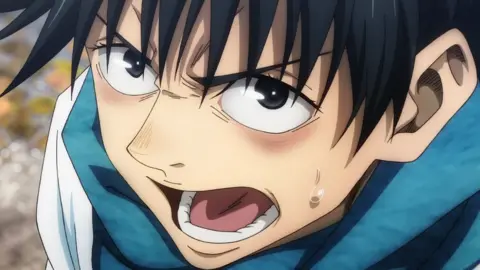 Gege Akutami/Shueisha
Gege Akutami/ShueishaJapanese animation Jujutsu Kaisen 0 has become a surprise box office hit, as anime enjoys a new global popularity in cinemas and on streaming services.
Last weekend, an animated Japanese high school student who is haunted by the spirit of his childhood sweetheart was second only to The Batman in the UK box office chart, and beat Catherine Tate and Sir Mark Rylance, who starred in other new releases.
Jujutsu Kaisen 0 - a prequel to a successful streaming TV series, itself based on popular manga comics - has become the latest successful anime export.
Anime is known for its distinctive style using bold colours, pronounced and expressive facial features, and far-out storylines. It deals with themes from growing up to the importance of friendship, often along with graphic violence and some sexual undertones.
It has been around for decades in Japan and gained a foothold in the West in the 1990s, but reached a new level of popularity around the world in the past few years.
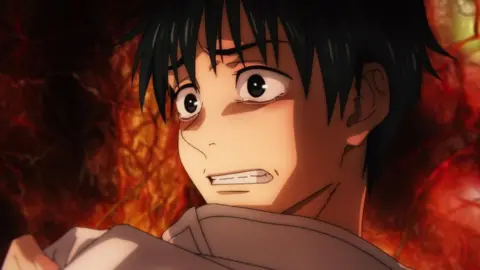 Gege Akutami/Shueisha
Gege Akutami/ShueishaNetflix says more than 100 million households around the world watched at least one anime title in the first nine months of 2020, a 50% increase from 2019. Meanwhile, anime only sites like Crunchyroll have also seen a rise in viewers.
Shiro Yoshioka, a lecturer in Japanese studies at Newcastle University, says streaming sites have "lowered the barrier to be a fan of anime significantly and has helped it become more mainstream than it used to be".
Jujutsu Kaisen 0 made almost $15m (£11m) at US and Canadian cinemas last weekend and another £825,000 in the UK and Ireland.
'Masterful' film
"This is a terrific opening," David A Gross, who runs movie consulting firm Franchise Entertainment Research, told Reuters. "Reviews are exceptional for this and for all of Funimation/Crunchyroll movies. They have not missed."
Those reviews included one in The Guardian, which said the "dazzling coming-of-age tale masterfully contemplates the knotty process of coming to terms with past traumas through a horror-fantasy lens".
Directed by Sunghoo Park, it has more graphic violence than some previous Japanese animations as a result of its darker themes and tone.
The film comes after the success of Demon Slayer, which became the highest-grossing anime film worldwide, making $90m (£68m) outside Japan in 2021 despite being released during the pandemic.
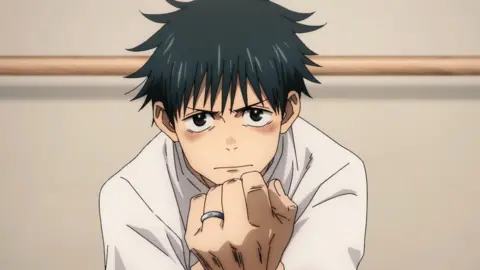 Gege Akutami/Shueisha
Gege Akutami/ShueishaCrunchyroll released Jujutsu Kaisen 0 in US cinemas and has seen its streaming numbers go from one million paid subscribers in 2017 to five million last year. Sony bought the company for $1.175bn (£900m) in 2021.
Chief content officer Asa Suehira said the growth of streaming and video games had led to "more fans with a comfort and interest around adult dramatic animation".
Dr Yoshioka believes it is "the complexity and difference from Western visual media that attract young people to anime".
He adds: "There is still a mindset in the West that animation is for children, whereas in Japan, the genre is for audiences of all ages, and the content reflects that."
Dr Filippo Cervelli, a lecturer in modern Japanese literature at the SOAS University of London (School of Oriental and African Studies), has seen an increase in the number of students writing theses on anime.
"This shows how anime are appreciated but are also seen as sources of cultural insights," he says. "Many popular anime show Japanese urban backgrounds, Japanese food and other elements of daily life that can be new and attractive to UK audiences used to different architectures or daily rhythms.
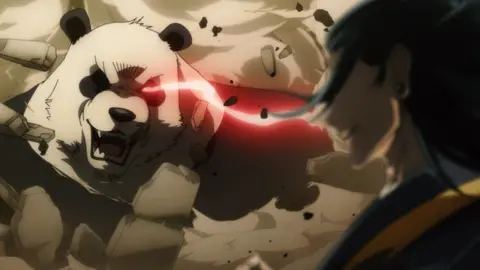 Gege Akutami/Shueisha
Gege Akutami/ShueishaFor a growing number of parents, they may wonder whether the content their children are watching is appropriate.
Vansh Gulati from Epic Dope, a site dedicated to all things anime, says it should not be confused with hentai - or Japanese animated pornography. "Many parents think of anime to be porn disguised as aesthetic glitter-covered cartoons," he says.
He advises that, like any other form of media, parents should monitor what their children watch. They can also read reviews, check age ratings and make sure they don't stray into shows rated for adults.
Anna Parker-Naples, a parent of three, thinks anime has its benefits but it's important to know what your children are watching.
"Sometimes the way that death is portrayed, even if it's graphics, can be quite bloody and brutal. I think it's the adult themes woven into some of the stories. We just never know at what point they're going to become overly violent.
"We want to make sure we're on board with what they are watching. So quite often, we will watch a few episodes of the series before we let them watch something."
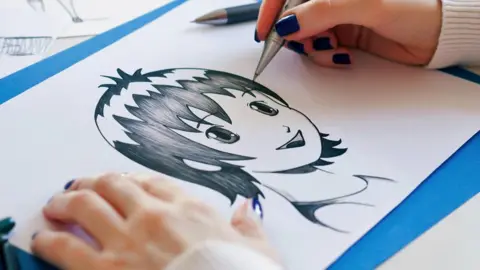 Getty Images
Getty ImagesOne of her children is drawn to the artistry of anime because some of it can be "quite beautiful", she adds.
"For us, watching our children be inspired by something that they were then wanting to draw and be creative, we quite like that."
For some fans, especially for younger viewers, having something in common with other like-minded people brings about a sense of belonging and acceptance.
"I think they sort of self-identify with all the people that watch anime. They know who is into it, so even if they're not all friends together, they recognise that they're part of it."
